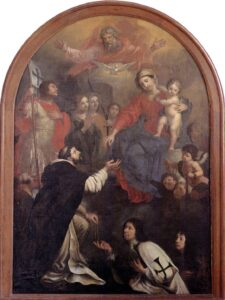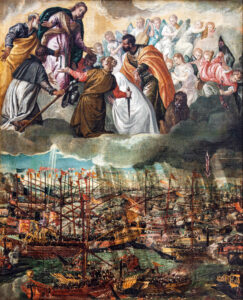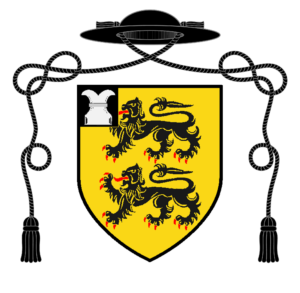Our Lord’s Help and Ours
by Fr. William Rock, FSSP
“And the Lord God said: It is not good for man to be alone: let us make him a help like unto himself” (Gen 2:18). While this verse from Genesis is familiar, there is a level of meaning which is missed in the English translation for the Hebrew word translated as “help” or “helper” (עֵזֶר / ‛ezer) can have a military or martial, warfighting, connotation.1 As such, it would not be much of a stretch to translate this passage as “let us make him a military ally like unto himself.”

God creates Eve, and, when He presents her to Adam, Adam says, “She shall be called woman, because she was taken out of man” (Gen 2:23). In the original Hebrew, there is a play on the words “man” and “woman” (מאישׁ / ‘ish and אשׁה / ‘ishah respectively), similar to that in English. When St. Jerome translated this passage from Hebrew into Latin, he ensured this play was retained. The usual Latin words for “woman” are femina and mulier, but here Jerome used the word virago, to play off the Latin word for man, vir – “man” and “woman,” vir and virago. Happily, the word virago’s normal meaning is “warlike or heroic woman, a heroine, a heroic maiden.” So, God created Eve, this heroic maiden, to be the helpmate, the military ally, to Adam. Why? Because they were set in Eden not just to enjoy it, but, as Scripture says, to “dress it, and to keep it” (Gen 2:15). Adam and Eve were placed there to take care of the plants, but also to keep the Garden, to keep it from evil, to keep out the evil of the fallen angels and their own personal evil.
Unfortunately for us and for them, Adam and his military helpmate failed in this, let in the evil, were stripped of all their supernatural and preternatural gifts, and were exiled from the Garden. Worse still, heaven was closed to them, and their nature was wounded by sin. But as dark as this seems, all was not lost, for a second Adam came to the fight, Christ Our Lord (1 Cor 15:45). And just like the first Adam, this second Adam would have His helpmate, His military alley, His Eve – and this second Eve is, according to the testimony of the Fathers, the Blessed Virgin Mary.2 The Blessed Virgin, the promised woman who crushes the head of the serpent (Gen 3:15), strove in union with Our Lord for our salvation as she stood at the foot of the Cross. The Church recognizes that Our Lady is a heroic maiden in the praise offered to her – “Who is this, beautiful as a dove, like a rose planted by the brooks of water? It is the mighty Virgin, like the tower of David; a thousand bucklers hang upon it, all the armour of valiant men.”3

But Our Lady’s mission as a military ally did not end with her Son’s Ascension or her own Assumption. As Our Lord was hanging upon the Cross, He addressed His Mother, calling her “woman” (Joh 19:26) – no doubt a reference back to the passage in Genesis where Jerome introduces to us the heroic maiden – and gave her to all of us, in the person of St. John, as an adopted Mother, yes, but also as a military ally for our battles, and not just us individually, but also the Church as a whole.
Not only does Mary enter into the battle with us and for us, but she has entrusted us with a powerful weapon by which we can call upon her aid and strive against our foes. The Rosary – in more or less its present form – was, according to pious tradition, given by Our Lady to St. Dominic as the tool for defeating the Albigensian heresy.4 This was by no means, however, the last time Our Lady would procure victory through the pious use of her Rosary.

On the First Sunday in October – October 7, 1571 – the Christian fleet, commanded by Don Juan of Austria, engaged the Turkish fleet in the Gulf of Lepanto. The Christian victory – which preserved Christendom from a Turkish sea-invasion – was in large part due to the prayers of the Rosary confraternities. In thanksgiving and in commemoration of this victory, Pope St. Pius V established the Feast of Our Lady of Victory. “His successor, Gregory XIII, altered this title to Our Lady of the Rosary, and appointed the first Sunday of October for the new feast,” the same day of the month as the naval victory.5 “In 1716, Clement XI inscribed the feast of the Rosary on the universal calendar, in gratitude for the victory gained by Prince Eugene”6 over the Turks. More recently, the Feast Day of Our Lady of the Rosary was moved to October 7, the calendar date of the battle of Lepanto, but an External Solemnity of Our Lady of the Rosary may still be celebrated on the First Sunday of October.
As we read in the Book of Job, “the life of man upon earth is a warfare” (7:1) but we are not without allies. Our Lady is the military ally par excellence given to us by Our Lord, and she is more than ready to enter into battle with and for us, not just against political and ecclesial enemies such as naval fleets and heresies, but also against our personal enemies of the world, the flesh, and the devil. But if we want her to be with us in the combat, we need to call upon her. And we do this by praying to her and especially by using the weapon she herself gave us, her holy Rosary. Let us then, in this month of the Holy Rosary, commit ourselves to call upon Mary to aid us in our struggles against our enemies, personal, political, social, and ecclesial. And let us respond to her request given at Fatima to pray five mysteries of the Rosary daily. If we are already in the habit of doing this, let us try to pray more fervently. If we are not in this habit, let us take up the practice, if only for this month.
Our Lady of Victory, Our Lady of the Most Holy Rosary, pray for us!
Fr. William Rock, FSSP was ordained in the fall of 2019 and is currently assigned to Regina Caeli Parish in Houston, TX.
- “The Hebrew ‘ezer kenegdo (King James Version ‘help”) is notoriously difficult to translate. The second term means ‘alongside him,’ ‘opposite him,’ ‘a counterpart to him.’ ‘Help’ is too weak because it suggests a merely auxiliary function, whereas ‘ezer [עֵזֶר] elsewhere connotes active intervention on behalf of someone, especially in military contexts, as often in Psalms.” – Alter, Robert. The Hebrew Bible – A Translation with Commentary. (New York: W. W. Norton & Company, 2018), Commentary on Gen 2:18.
- First and Second Antiphons at Vespers of the Feast of Our Lady of the Rosary (Beatæ Mariæ Virginis a Rosario). Translation taken from The Divinum Officium Project.
- Pitre, Brant. Jesus and the Jewish Roots of Mary – Unveiling the Mother of the Messiah. (New York: Image Press, 2018), pp. 33-35.
- Guéranger, Prosper. The Liturgical Year, vol. 14 (Time after Pentecost Book V). Trans. The Benedictines of Stanbrook Abbey. (Fitzwilliam: Loreto Publications, 2000), p. 296.
- Ibid., p. 297.
- Ibid, p. 298.
October 1, 2023









